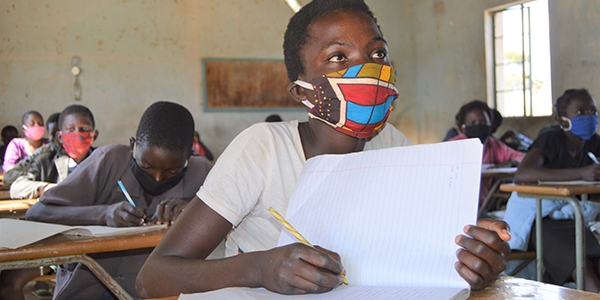
Mutinta is happy to be back in class after being home since March. Photo credit: Malama Mwila / Save the Children, 2020.
If Children Say They Want an Education, We Must Listen
It is often forgotten that listening to what children have to say in an emergency is not just ‘a nice thing to do’, it is a humanitarian obligation. The United Nations Convention on the Rights of the Child – the most widely ratified international human rights treaty in history, which marked its 30th anniversary in 2019 – enshrines the right of children to participate through being “heard and taken seriously”.
The Convention is clear. If children say they want education, we must listen.
In Save the Children’s report, Education Against the Odds, experts reviewed a decade’s worth of data to capture the hopes and fears of more than 8,000 children in the toughest places on earth. This was combined with data from qualitative interviews with children aged 5–18 in emergencies conducted between 2013 and 2018.
Time and time again, their greatest desires are clear, unambiguous – and surprising. Even when food is scarce, water is dirty and medical care non-existent, children tell us they want one thing above all else: the chance to go to school.
Education Plays a Vital Role In Restoring Children’s Hope
Schools not only provide children with a space to learn. Education gives children the skills and knowledge they need to escape a crisis and build a future, helping them to rebuild their lives after emergencies. It protects them from child marriage, exploitation and abuse. It helps them recover from traumatic experiences, and demonstrably improves their mental health.
For many children school is also a safe place where they can receive meals, access healthcare, including mental health services, and play with their friends. Teachers can be children’s frontline responders and protectors. But with school closures, children are missing out on these essentials the school environment can offer.
Education Was Already in Crisis
Even before the coronavirus pandemic hit, too many children were missing out on a education.
- Nearly 258 million children were out of school, including 130 million girls[i]
- 75 million children caught up in humanitarian crises were in desperate need of educational support.[ii]
- 4 million children in Syria and Yemen were locked out of education because their schools were destroyed
Then, in early April 2020, in an effort to halt the spread of COVID-19, widespread school closures went into effect. An estimated 1.6 billion learners globally – 91% of the total – were out of school. For the first time in human history, an entire generation of children globally had their education disrupted.

"I want to learn here and to become a teacher when I grow up. I want teaching to be my future", said Hamza*, whose education has already been distrupted several times because of the conflict in Syria.
Education Can't Be Delayed
Save the Children knows from our extensive work with children from fragile and conflict-affected states that when crises hit, children want to be able to continue their education. They tell us that education cannot be delayed because it is the key to their future, their protection, their happiness and their health.
Our report revealed that children affected by crises are more than twice as likely to rank going to school as their top concern over other needs.
- On average, 37% of the children surveyed placed education among their top three needs
- In next order of priority, they identified food (19%), healthcare (19%), water (16%) and shelter (15%) as additional concerns
Faced with extreme adversity, children of all ages see education as the key to their safety, their health, their happiness and their future. Children like Hamza*, 13, who told us: “I want to learn here and to become a teacher when I grow up. I want teaching to be my future.” Hamza has been living with his family in a refugee camp in Syria ever since they had to flee their home in 2018.
We also know that during previous health crises children were concerned about missing out on education. During the 2014–16 Ebola crisis in West Africa, UNICEF surveyed young people about what bothered them most about the crisis. 71% answered “No school.”
Together, We Must Protect Every Child's Right to Learn
Save the Children is calling for governments and donors to respond to this global education emergency by urgently investing in education as schools begin to reopen after months of lockdown.
We urge governments and donors to ensure that out-of-school children have access to distance learning and to protection services. Those who return to school should be able to do so in a safe and inclusive way, with access to school meals and health services.
Save the Children’s Response to COVID-19
Save the Children has extensive expertise and decades of experience in delivering quality learning opportunities in some of the most challenging humanitarian contexts. All over the world, amid the COVID-19 crisis, we are adapting and expanding existing work to keep children safe, healthy and continuing their learning.
Learn more about our response and how you can help children in need.
[i] Save Our Education
[ii] Education Against the Odds
* Name changed for protection.
Thank you for signing up! Now, you’ll be among the first to know how Save the Children is responding to the most urgent needs of children, every day and in times of crisis—and how your support can make a difference. You may opt-out at any time by clicking "unsubscribe" at the bottom of any email.
By providing my mobile phone number, I agree to receive recurring text messages from Save the Children (48188) and phone calls with opportunities to donate and ways to engage in our mission to support children around the world. Text STOP to opt-out, HELP for info. Message & data rates may apply. View our Privacy Policy at savethechildren.org/privacy.